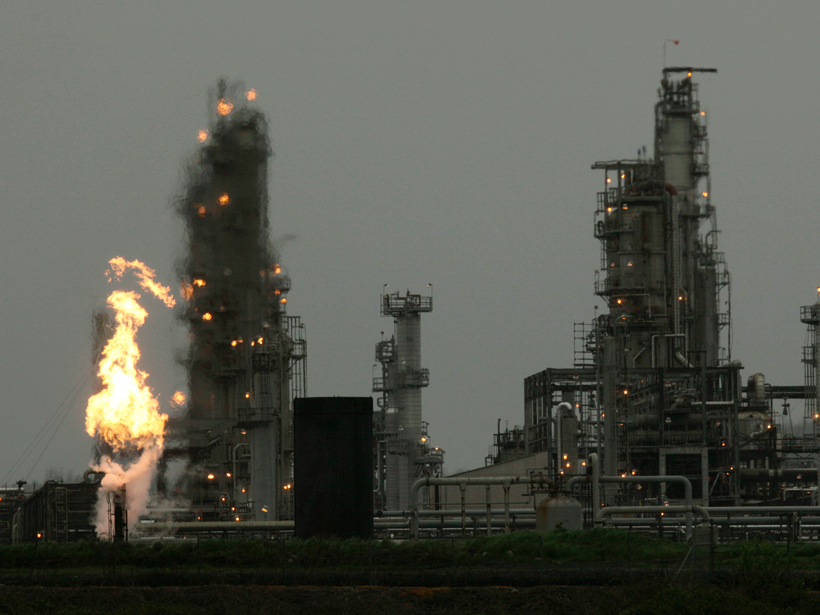While you were watching the results of national elections roll in on Tuesday night, the first ballot measure to impose a carbon tax on fossil fuel emissions was dying a quiet death in Washington state. Initiative 732 ultimately received the support of 42% of those who cast ballots in Washington, winning a majority only in King County, where Seattle is located.
Tax Trade-Offs
“Grassroots activism accomplished what many environmental leaders and media pundits said was impossible: we put a revenue-neutral carbon tax on the ballot,” said Yoram Bauman, founder and cochair of Carbon Washington, the organization behind the initiative, in a statement released on their website. “We will look back at this as a lost opportunity to create history in Washington State, but also as a catalyst for much needed U.S. leadership on climate action.”
Initiative 732 would have instated a tax of $25 per metric ton on fossil fuels consumed in the state while reducing the state sales tax by 1%.
Initiative 732, referred to as “I-732,” would have instated a tax of $25 per metric ton on fossil fuels consumed in the state while reducing the state sales tax by 1%, funding a tax rebate similar to the federal earned income tax credit for lower-income families, and eliminating a tax on business income. But the measure failed to find unanimous support among the region’s environmentalists, many of whom were concerned about its failure to engage minority and low-income groups and the possible loss of revenue to fund other important state programs.
Carbon Washington campaigned on the promise that the tax would be revenue neutral, but an analysis done by nonpartisan staff of the Washington state legislature calculated that the measure could cost the state $675 million over 4 years.
The “No” Campaign
Business and industry groups, including American Fuel and Petrochemical Manufacturers (AFPM), vehemently opposed the initiative. AFPM was a top contributor to the “No on 732” campaign organized by the Association of Washington Business (AWB). In addition to potential revenue loss to the state, the “No” campaign said it objected to increased costs the opponents expected the initiative to impose on consumers for gasoline, electricity, and natural gas.
Despite a “broad consensus” on the need to control carbon emissions, “voters have rejected a flawed proposal to simply drive up energy prices on Washington families, workers and employers,” AWB’s government affairs director Brandon Houskeeper told Eos in an emailed statement. “Now it’s time to come back together to find solutions that reduce carbon emissions through collaboration, not higher energy bills.”
The Sierra Club also declined to support the initiative. “Communities of color and low-income people are almost always the ones most impacted by pollution and climate change,” said a statement from the Sierra Club’s Washington chapter. However, drafters of I-732 didn’t adequately include those communities when crafting their initiative and overlooked their needs, including “green jobs, energy efficiency, transit, housing, and renewable energy infrastructure,” the chapter argued.
Voices of Support

Other environmental groups, including the Audubon Society, campaigned in support of the initiative. “We surveyed our membership about it and met with all of our local chapters, and overwhelmingly people said that this was an important issue,” said Audubon Washington executive director Gail Gatton. “We’ll keep our eyes out for what comes next, and in the meantime, we’re doing other work on the climate front. Here in our state we hope to have a chance this next legislative session to work on renewable energy incentives.” The next session of the Washington state legislature begins in January 2017.
More than 50 scientists from the University of Washington in Seattle signed an open letter in support of I-732, in which they wrote that national leadership on climate issues can be spurred by regional efforts. “While many interrelated social and environmental needs demand our attention, complex problems are best solved one step at a time,” the letter said. “I-732 is a simple step in the right direction.”
Atmospheric and climate scientist Amy Snover, who directs the Climate Impacts Group at the University of Washington, Seattle, sees an important role for climate science in helping to inform policy choices such as whether to tax carbon emissions. What’s “exciting is that we’re actually at a stage where we’re having a conversation about the preferred approach for dealing with emissions,” she said.
—Rebecca Heisman (email: [email protected]), Freelance Science Journalist
Citation:
Heisman, R. (2016), Carbon tax initiative fails in Washington state, Eos, 97, https://doi.org/10.1029/2016EO062869. Published on 14 November 2016.
Text © 2016. The authors. CC BY-NC-ND 3.0
Except where otherwise noted, images are subject to copyright. Any reuse without express permission from the copyright owner is prohibited.

